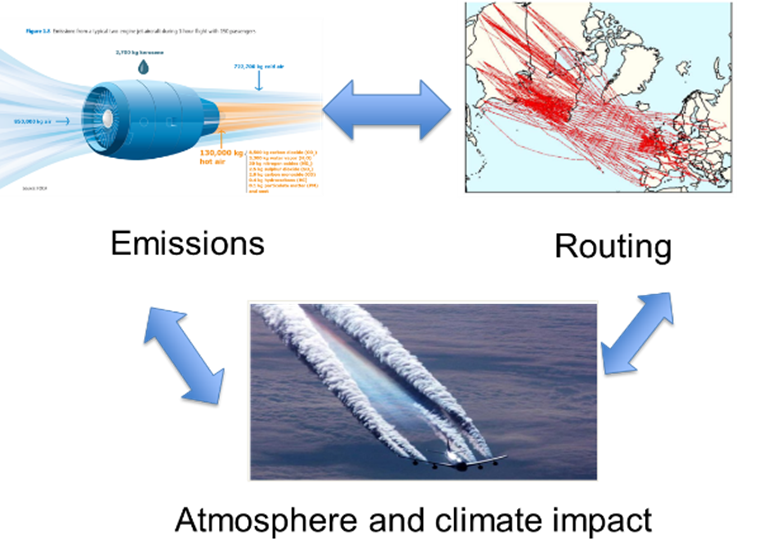Overview of the ClimProp project
The growth in air transportation will inevitably lead to an increase in aircraft combustion emissions and the consequent climate impact. Overall, CO2 emission shares less than 50% of the total aviation radiative forcing if non-CO2 effects from NOx, water vapor, direct aerosol, contrails and the induced cirrus (contrail-cirrus) are included. An effective mitigation strategy is expected to address both CO2 and non-CO2 effects of aviation. The future aircraft engine technologies, including ultra-efficient engine cycle, novel engine cycles, and engines using alternative energy sources will play essential roles.
Project objectives:
The ClimProp project aims at understanding the sensitivity of the global climate change to future propulsion technologies attributed to engine cycles, designs and energy sources by combining both the CO2 and non-CO2 effects, thereby providing an astute insight for the aviation community to choose the most climate-friendly technology.
Project goals:
- Engine performance and emission modelling attributed to novel cycles and combustion technologies
- Evaluating the climate impact of novel engine cycles, e.g., intercooled, inter-stage turbine burning, and hybrid electric propulsion
- Develop the first climate model for climate optimized engine design.
Expected results:
The earlier research shows that novel cycles like intercooling, inter-stage turbine burner engines can have high potential in reducing the NOx emissions. Over the course of the project, details regarding the performance and emissions of these novel cycles will be understood and the consequent climate impact will be assessed.
The climate model developed in this project describes the sensitivity of climate change to engine design variables, and allows this model to be integrated to the current engine design framework for climate optimized engine design.
General information:
- Total budget: 322 kEuro (NWO VENI scheme: 250 kEuro; DLR Institute for Atmospheric Physics: 72 kEuro)
- Duration: 12/2019-11/2023
- Principal investigator: Dr. Feijia Yin
Approach:
Aviation’s climate impact (specifically non-CO2 effects) depends on geographical location, altitude and time of aircraft. Non-CO2 climate impact of aviation emissions varies with actual meteorological situation, described by atmospheric chemistry and physics. An interactive approach between emissions, routing network and atmosphere will be used in this research.
User committee members
The user committee of ClimProp aims to involve relevant stakeholders to steer the R&D activities of the project. For this reason, it comprises a variety of members like airlines, manufacturers, and academy, as described below.
TU Delft/Aerospace Engineering/ANCEThe research group ANCE is integrated under the department of Control and Operations (C&O). The research group is active in modelling environmental effects (noise, local air quality and climate) of aviation. They have been involved in climate modelling as a contributor to a large community model EMAC, which is a sophisticated earth-system model. Furthermore, ANCE has been involved in different EU projects to study the climate impact of aviation. |
TU Delft/Aerospace Engineering/FPPThe FPP section embeds flight performance and propulsion and power expertise. We focus on advanced / innovative aircraft configurations and novel and possibly disruptive propulsion and power concepts. Hence, aircraft engine integration is also an important topic. These research areas are highly relevant if we want to contribute to the ambitious targets for the environmental impact of aviation, proposed by the Advisory Committee for Aeronautics Research in Europe (ACARE). |
DLR Atmospheric InstituteThe DLR Institute of Atmospheric Physics investigates the physics and chemistry of the global atmosphere from the Earth's surface up to the upper boundary of the middle atmosphere at about 120 km height. As an institute of the German Aerospace Center (DLR) we answer questions associated with atmospheric processes and with relevance to the research programs "Aeronautics, Space, and Transportation" and "Energy" of the Helmholtz Association (HGF). |
MTU Aero EnginesMTU Aero Engines is Germany's leading engine manufacturer and an established global player in the industry. It engages in the development, manufacture, marketing and support of commercial and military aircraft engines in all thrust and power categories and industrial gas turbines. The German manufacturer employs approximately 10,000 people overall and with its various affiliates and subsidiaries has a presence in all significant regions and markets worldwide. In the years ahead, MTU will focus its resources on its core business, seek stakes in emerging engine programs and expand its service offerings. |
KLM Royal Dutch Airline Engine ServicesKLM Royal Dutch Airlines engine services is part of KLM Engineering & Maintenance and provides Maintenance Repair and Overhaul of the following engines: CFM56-7B; CF6-80C2; CF6-80E1; GEnx and LEAP. In addition to this, KLM engine services section also works on parts repair of various LM engines, on wing support and engineering support. KLM is involved in multiple initiatives and research projects to make aviation more sustainable. |
Disseminations
Technical papers
-
Abstract: Aviation is responsible for approximately 5% of global warming and is expected to increase substantially in the future. Given the continuing expansion of air traffic, mitigation of aviation’s climate impact becomes challenging but imperative. Among various mitigation options, hybrid-electric aircraft (HEA) have drawn intensive attention due to their considerable potential in reducing greenhouse gas emissions (e.g., CO2). However, the non-CO2 effects (especially contrails) of HEA on climate change are more challenging to assess. As the first step to understanding the climate impact of HEA, this research investigates the effects on the formation of persistent contrails when flying with HEA. The simulation is performed using an Earth System Model (EMAC) coupled with a submodel (CONTRAIL), where the contrail formation criterion, the Schmidt–Appleman criterion (SAC), is adapted to globally estimate changes in the potential contrail coverage (PCC). We compared the HEA to conventional (reference) aircraft with the same characteristics, except for the propulsion system. The analysis showed that the temperature threshold of contrail formation for HEA is lower; therefore, conventional reference aircraft can form contrails at lower flight altitudes, whereas the HEA does not. For a given flight altitude, with a small fraction of electric power in use (less than 30%), the potential contrail coverage remained nearly unchanged. As the electric power fraction increased, the reduction in contrail formation was mainly observed in the mid-latitudes (30° N and 40° S) or tropical regions and was very much localized with a maximum value of about 40% locally. The analysis of seasonal effects showed that in non-summer, the reduction in contrail formation using electric power was more pronounced at lower flight altitudes, whereas in summer the changes in PCC were nearly constant with respect to altitude.
Full length paper: https://doi.org/10.3390/aerospace7100147
-
Society is going through transformations at a rate that is unprecedented in human history. One such transformation is the energy transition, which will affect almost every facet of our society. Gas turbine engines are state of the art machines, a backbone of modern society, and used in various applications, right from power generation to propelling aircraft and ships. This paper reviews the possibilities offered by the Inter-stage Turbine Burner (ITB) configuration for both aviation and power generation with a view on sustainability and fuel flexibility.
First, the thermodynamic characteristics of a Brayton-Joule cycle with ITB is elaborated, followed by discussions on the design and the off-design performance characteristics of such a gas turbine architectural variation. Finally, the viability of ITB architecture in reducing emissions and enabling "Energy Mix" in aviation is elaborated. The paper concludes with an outlook on the technological readiness ladder that the engineering community will have to address in the future.
Full length paper: https://doi.org/10.1016/j.paerosci.2020.100695
Presentations
-
Aircraft propulsion system plays an essential role in reducing the aviation’s environmental impact. In the past, the cycle efficiency of engine has improved significantly via increasing engine pressure ratio, operating temperature and bypass ratio. The increase in engine efficiency reduces fuel consumption, hence the related greenhouse gas emissions. However, the overall climate footprint of aircraft engine technology remains ambiguous, as more than 50% of the aviation’s climate impact is caused by non-CO2 effects like NOx, H2O, contrails, etc. The NWO funded VENI research project “Fly Green: Climate impact of future Propulsion system (ClimProp)” aims to develop the first climate propulsion model which can be used: 1) to evaluate the climate footprint of engine technological advancement represented by engine design parameters and the effects of potential alternative energy sources in future; 2) to be implemented in the existing engine design framework to enable the climate optimized engine design in future considering potential trade-offs between CO2 and non-CO2 effects. This paper presents an overview of the “ClimProp” concept.
-
TUD AE ANCE
-
TUD AE FPP
-
DLR Atmospheric Institute
-
MTU Aero Engines
-
KLM Royal Dutch Airline Engine Services


